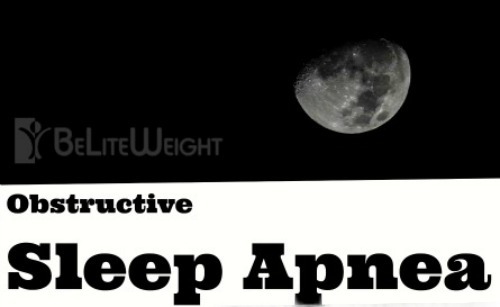Snoring is often joked about socially but generally goes unnoticed as a medical concern. Unfortunately, a serious sleeping condition often gets overlooked, which can triple the risk of death for the affected! Certain signs such as consistent loud snoring, daytime fatigue, and weight gain may be indications of this serious illness called Obstructive Sleep Apnea (OSA).
What is Sleep Apnea?
Obstructive Sleep Apnea is a sleeping disorder that interrupts a person’s breathing while they are asleep. People with this disorder repeatedly stop breathing while sleeping which usually results in a reduced oxygen supply to the brain and the tissues of the body.
Each pause in breathing is called an “apnea” and can last for several seconds to several minutes. When breathing is paused, carbon dioxide builds up in the bloodstream and chemoreceptors in the blood stream instantly respond to the high carbon dioxide levels. The brain is then signaled to wake the sleeping person and breathe in air in order to release the carbon dioxide built up. Breathing normally restores oxygen levels and the person falls asleep again.
Effects of Sleep Apnea
Sleep apnea can result in a growing number of health problems, including:
- High blood pressure
- Stroke
- Heart Problems
- Diabetes
- Depression
- Headache
- Weight Gain
Bariatric Surgery as Resolution for Sleep Apnea
Obstructive Sleep Apnea (OSA) is a common chronic disorder that often requires lifelong care and tends to affect those with obesity at much higher rates. It is well documented that daytime fatigue can be prevalent in obese patients even though they may not demonstrate symptoms of sleep apnea. However, there is strong data demonstrating the fact that obese patients run a proportionately much higher risk of having sleep apnea.
Research and statistical data show that bariatric surgery is an effective treatment for OSA in patients who are obese and often also resolves the underlying co-morbidities of sleep apnea. While scientific reasoning for this requires further study it is theorized that the weight loss is associated with a decrease in upper airway collapsibility, which is one of the major causes of Obstructive Sleep Apnea.
Effective weight loss through bariatric surgery has helped many patients achieve complete resolution and improvement of their co-morbidities such as diabetes, hyperlipidemia, hypertension, and obstructive sleep apnea. Studies show sleep investigations performed approximately one year after the bariatric surgery revealed a significant decrease in the number of "apnea" episodes per hour of sleep and an improvement in all sleep quality related measurements as well. Bariatric surgery is perfectly suited for obese patients with OSA.
Conclusion
The correlation between Sleep Apnea and obesity has been well documented and supported through modern science. Clinical data, medical trials, and patient testimonials all underscore major improvements in the symptoms of Sleep Apnea after bariatric surgery. Procedures like the Roux-En-Y Gastric Bypass (RYGB), Mini-Gastric Bypass (MGB), and Vertical Sleeve Gastrectomy (VSG / Gastric Sleeve), have been shown to reduce all signs of sleep apnea including postoperative sleep quality, reduce daytime sleepiness, and remove the need for a night time sleeping machine.
If you would like to hear more about how weight loss surgery can potentially help sleep apnea and weight related comorbidities click here and inquire today!
Continue reading for more information on Sleep Apnea
Types of Sleep Apnea
Sleep Apnea exists in the following types:
- Obstructive Sleep Apnea: This is the most common type of sleep apnea and occurs when the tissue at the back of the throat relaxes during sleep blocking the airway or air passage resulting in loud snoring.
- Central Sleep Apnea: This type of sleep apnea is less prevalent as it involves a person’s central nervous system and is not characterized by snoring. It occurs when the brain fails to signal the muscles that control breathing.
- Complex Sleep Apnea: This is combination of obstructive sleep apnea and central sleep apnea.
Symptoms of Sleep Apnea
Major symptoms of sleep apnea include:
- Loud and chronic snoring every night
- Choking, snorting, or gasping during sleep
- Pauses in breathing while asleep
- Waking up at night feeling short of breath
- Daytime sleepiness and fatigue
- High cholesterol levels
- Obesity
Diagnosing Sleep Apnea
Diagnosing sleep apnea is tricky because it is impossible to observe the prominent symptoms of sleep apnea by one’s self as the apneas occur only when asleep. Fortunately, there are ways to get around this difficulty. A person may ask someone in their home to observe their sleeping habits or can use a cell phone or electronic device to make a recording of their sleeping themself.
If you are unsure about your sleep apnea diagnosis it is highly recommended to seek the help of a professional medical practitioner who can monitor any snoring, choking or gasping while you are asleep.
Links to info:
http://www.uwhealth.org/referring-physician-news/death-rate-triples-for-sleep-apnea-sufferers/13986
https://en.wikipedia.org/wiki/Sleep_apnea
http://www.helpguide.org/articles/sleep/sleep-apnea.htm
http://www.nhlbi.nih.gov/health/health-topics/topics/sleepapnea
http://www.webmd.com/sleep-disorders/sleep-apnea/sleep-apnea
http://www.ncbi.nlm.nih.gov/pmc/articles/PMC2699173/
http://jama.jamanetwork.com/article.aspx?articleid=199587
http://ajcn.nutrition.org/content/55/2/594S.short
http://link.springer.com/article/10.1381/096089203321136593#page-1
http://www.atsjournals.org/doi/abs/10.1164/ajrccm/144.3_Pt_1.494#.Vo-TKpN95E5
http://link.springer.com/article/10.1007/s11695-007-9012-7#page-1
http://link.springer.com/article/10.1381/096089203322509228#page-1






